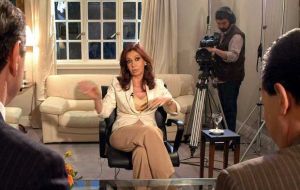MercoPress. South Atlantic News Agency
Cristina Kirchner and the fine art of eluding questions
 Cristina Kirchner during her last inteview before Sunday elections
Cristina Kirchner during her last inteview before Sunday elections Cristina Kirchner the leading candidate for Argentina Sunday's presidential election, during these last four years, as well as her husband President Nestor Kirchner has avoided contact with the Argentine press but this last week she has been particularly loquacious.
In several interviews she spoke about abortion, improving relations with the Catholic Church and was candid about her marriage and family. "I have always been opposed to abortion" said Cristina in an interview with two Buenos Aires radios. "I feel a lot of respect for other people's opinion. I don't think that those who favour the decriminalization of abortion may favour abortion; that would be a simplistic view", she underlined. Ginés González García, the Health minister of President Néstor Kirchner, has been fostering a wider decriminalization of abortion, which in Argentina is only allowed in cases of rape of mentally impaired women, and when there is a risk for the life of the mother. The First Lady also admitted she hasn't attended mass for a long time, but that if she wins, the links with the Catholic Church will be "normal." President Kirchner has often clashed with Church officials, mainly for his having appointed a free-choice advocate to the Supreme Court, and on his human rights policies which Church officials say are biased against the military. She said that she never underwent surgeries but did not rule out to undergo one "when face skin sags"- Mrs Kirchner said that once she used to smoke two cigarette packs a day but that she quit 20 years ago, and that she never smoked marijuana. She added that her husband used to smoke "four packs a day, had his hands yellow, threw the ashes out of the ashtrays, and quit three or four years after I did. He says that the only thing he regrets is to have smoked." Asked about her husband's physical looks she said: "I am worried about a part of the body that I cannot mention now because we are within the under-age protection time." But if Cristina is elected next Sunday she will take office December 10 with challenges that pale in comparison to what her husband Néstor Kirchner faced when he began his term in 2003: the 100-billion-dollar debt default had wiped out two-thirds of the savings of most Argentines overnight. Kirchner helped Argentina rebound from that crisis, and his popularity surged above 60%. But 8% annual growth rates have begun to cool – and so have his numbers. Now, though emerging from the crisis, Argentines are coping with the harsh reality that a quarter of their 37 million people still live below the poverty line. They're also suffering from high inflation, a simmering energy crisis and a still-lagging investment climate. And in a campaign in which she spent much of her time travelling abroad, Cristina offered few specifics on how she would deal with any of that. She hasn't participated in a single debate, and didn't grant an interview with Argentine news media until this half week, closed earlier because of the campaign ban. In the interview with a pro-government journalist, broadcast Wednesday on La Red radio, she didn't announce any specific proposals and brushed off comparisons to US Senator Hillary Clinton. "I don't want to be compared with Hillary Clinton, nor with (former first lady) Evita Perón, nor with anybody... There's nothing better than being yourself." Argentina's farming wealth once put it among the world's richest nations. It still has Latin America's largest middle class, but the gap between rich and poor remains large and many people see their spending power melting away. Crime – bank heists, street shootouts and house invasions – is eating away at Argentina's all-night cafe life and making neighbours reluctant to chat outside locked doors. Many complain the government is too soft on the criminals. And with electricity and gasoline prices all but frozen since 2001, many see an energy crisis coming when Argentines fire up their air conditioners in the summer. Managing the economy will require particularly tough decisions, which have been deferred this election year. Foreign investors remain wary of investing in Argentina, despite its economic recovery. In a report this month, a prominent group of Argentine economists estimated their country was losing 6 billion dollars a year in potential foreign investment because of a lack of confidence. Inflation has become a major political problem. The government reports it at 8.6% a year, but independent economists say it's double that, and many people believe the Kirchner administration has manipulated the consumer price index to make the economy look better than it is. On the energy front, Cristina has signalled she will put more power plants online and continue her husband's close alliances with President Hugo Chávez of Venezuela – a source of petrodollar largesse – and with leftist Evo Morales of Bolivia, which exports natural gas to Argentina. She promises clear differences from her husband's presidency but exactly what those are remains unclear. She speaks vaguely of creating more jobs, strengthening democratic institutions and financing new schools, hospitals and highways. (Buenos Aires Herald).




Top Comments
Disclaimer & comment rulesCommenting for this story is now closed.
If you have a Facebook account, become a fan and comment on our Facebook Page!